There are ample causes of brake pedal vibration. However, the solution is only to get the vehicle to the nearest service station right away to avoid any further damage.
Several questions arise in the mind when a car shakes or vibrates. For instance, where does the noise or vibration appear to be coming from? Is it the steering wheel, brake pedal, or some other part of the vehicle that’s not working properly?
Well, if the brake pedal shakes, then, it is potentially a serious issue that is simply making your vehicle unsafe to drive.
Contents
Brake Pedal Vibration: Causes And How To Fix
When the pressure is applied by foot on the brake pedal with optimum force, the system automatically strives to stop/slow the vehicle.
It gives a nice firm feel while applying the pressure, however, sometimes the vibration in brake pedal occurs when this pedal is deployed.
This motion in the brake varies from slight shaking to quite a severe shuddering, depending on the severity of the condition.
So to your ease, here are certain root causes explained, which may assist you in finding the main reasons why the car vibrates when braking.
Brake Pad Issue
Each caliper of the wheel has two brake pads, with the friction surface of these pads confronting the rotor.
So, when brakes are hydraulically applied (In simple words, brakes are made operational with liquid oil) then, the caliper squeezes the brake pads together onto the spinning rotor to stop the vehicle.
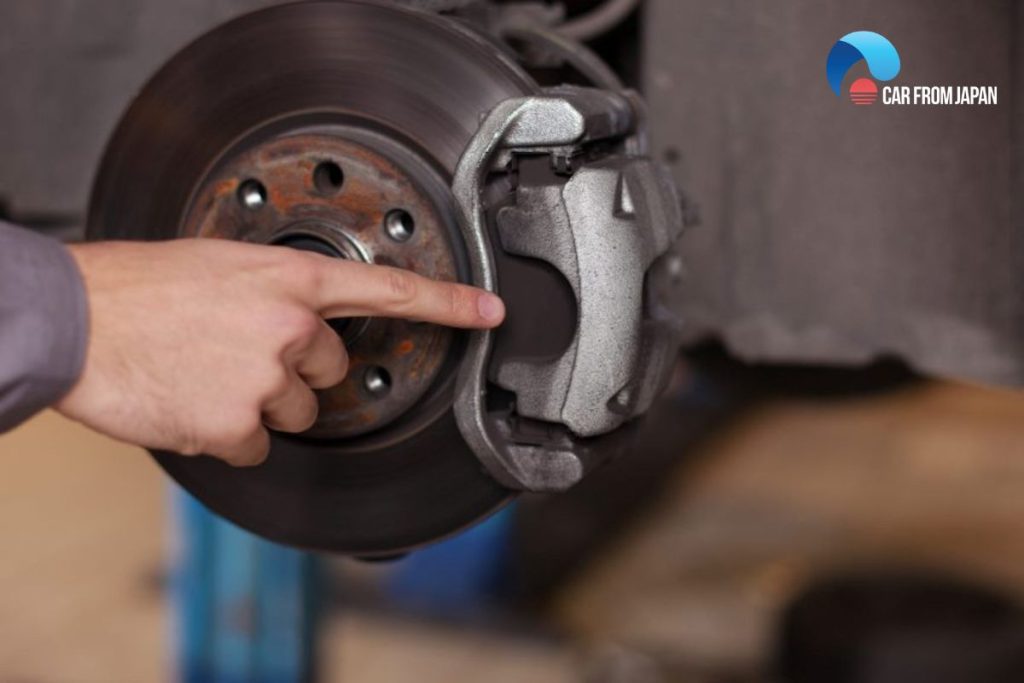
However, if pads are contaminated with oil, dirt, or other substance, then it causes the brake pedal vibrates during the clamping of brake pads onto the rotor.
Besides this, the wrapped, damaged, or excessively worn pads can also be one of the causes of vibrating brakes.
How to fix
You should dismantle the brake and then clean it to remove all dust, rust, and other pollutants. Getting rid of dirty things enables the car brake to operate smoothly.
In case that can not help, however, your last choice is to replace your pads. The cost of car brake pads varies from $35 to $150 for a complete set for one axle. It is higher for labor which costs from $100 to $300.
Brake Disc (Rotor)
The rotor part of the braking system is important. Therefore, it is critical to the overall safety of the vehicle that it is maintained properly.
This spinning part of a wheel’s disc brake assembly works against the brake pads. Typically of gray iron color (a form of cast iron), the rotor functions to slow/stop the vehicle.
It is latched to the wheel hub so this rotor spins in the direction of the wheel. When the brake is applied, the spinning rotor slows down the vehicle using friction from direct contact with the pads.
Hence, bad rotor conditions may cause brake pedal vibrates when stopping.
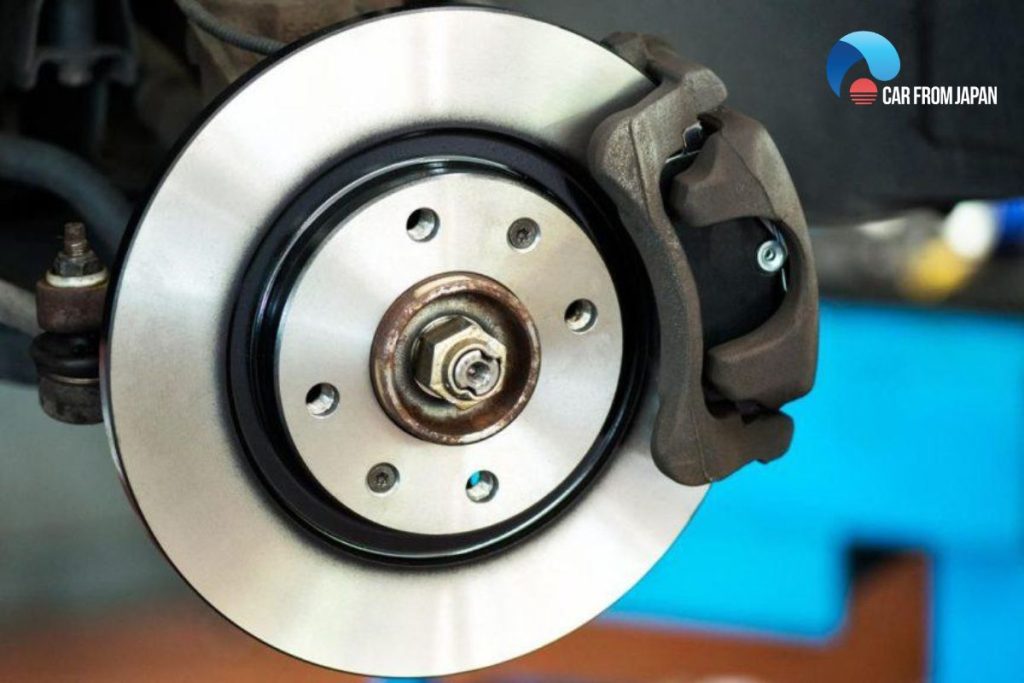
However, if this part of the system is scarred, cracked, warped, or rusted excessively then, it may cause an uneven grabbing of brakes, which can also produce squeaking sounds or pulsating feel, when the brakes are applied.
How to fix
Brake rotors need either resurfaced or replaced. Replacing or resurfacing both rotors (front set or rear set), even if only one of them is in bad condition, is crucial.
New brake pads are recommended when replacing the rotors because the worn surfaces of the pads will not make proper contact with the new smooth rotors.
It takes time for the surfaces of both parts to align properly if you do not replace them in unison.
Improper Wheel Alignment
The aligned tires of the vehicle obey the steering wheel perfectly. On the contrary, when there is a disorganization of tires, they tend to produce squealing sounds.
This unpleasant sound or vibration is caused by rubbing wheels against brake pads when the vehicle is fastened or slowed down.
Therefore, it must be dealt with at an early stage before it worsens the functioning of the brake system.
How to fix
For balancing issues, one indispensable process is wheel alignment. Applying an inspection will show which kind of alignment you need, a two or four-wheel alignment.
Commonly, a 4-wheel alignment is applied to SUVs while cars just need a 2 front wheel alignment. In case your rear axle is damaged, or the car frame itself, it is crucial to conduct a 4-wheel alignment.
Wear Out Components
Once the brake pads become thin or there is scarring or crack on the face of the rotor then, getting the vehicle to the nearest service station would help resolve the issue of the vibrating pedal.
Apart from these mentioned causes of brake pedal vibration, worn-out ball joints, tie rods, wheel bearings, and other parts of the system can also lead to brake problems.
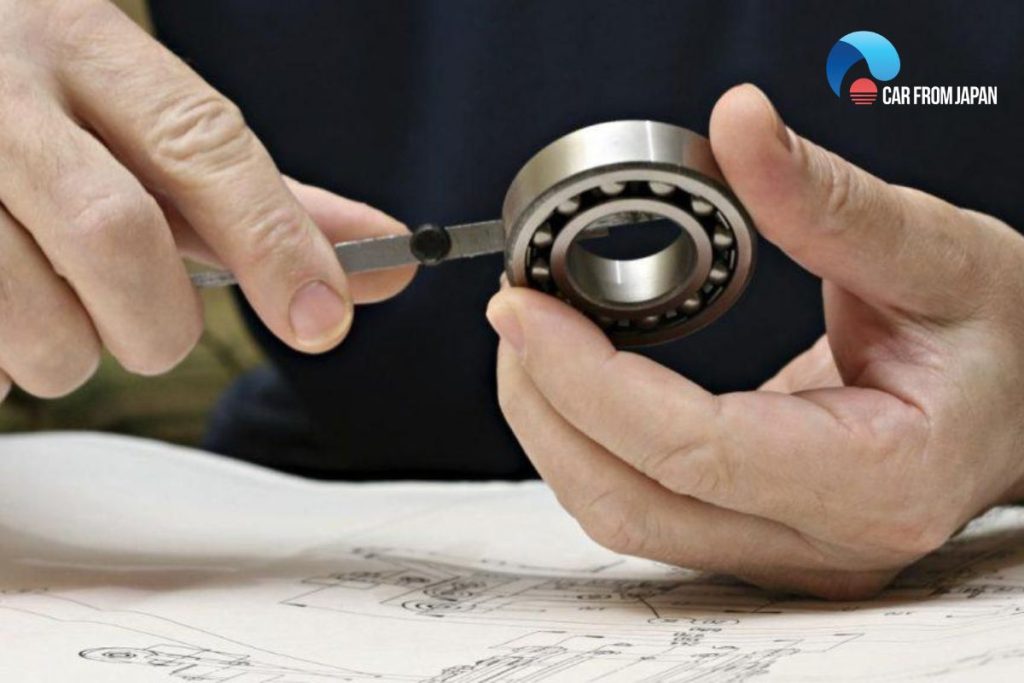
See More: How To Properly Diagnose Brake Noise?
How to fix
This issue is the hardest one to solve because it takes time and many inspections to diagnose exact worn components.
If you do not know much about engines or cars, it is highly recommended that you should get a car suspension inspection to find out the cause of the brake pedal vibrations.
How To Avoid Vibration When Braking?
Here are some strategies for dealing with car brake tremors.
Limit your use of the brakes
Because of the friction, brakes produce a lot of heat. So, to protect the braking system, try to avoid applying the brakes excessively.
Brake designs can withstand high temperatures, but they must cool down in between usage. The braking system cannot cool down when the brakes are applied repeatedly.
Use high-quality brake parts
Brake parts of lower quality, such as brake pads, can cause vibrations. Investing in high-quality components that are more resilient and heat-tolerant is a good idea. It will prevent concerns with rapid wear and overheating.
Visit a brake specialist
Having trouble with the technical aspects? The best course of action for you is to see a brake expert.
Brake vibration may be a sign of a larger issue, and a professional can resolve all the connected problems.
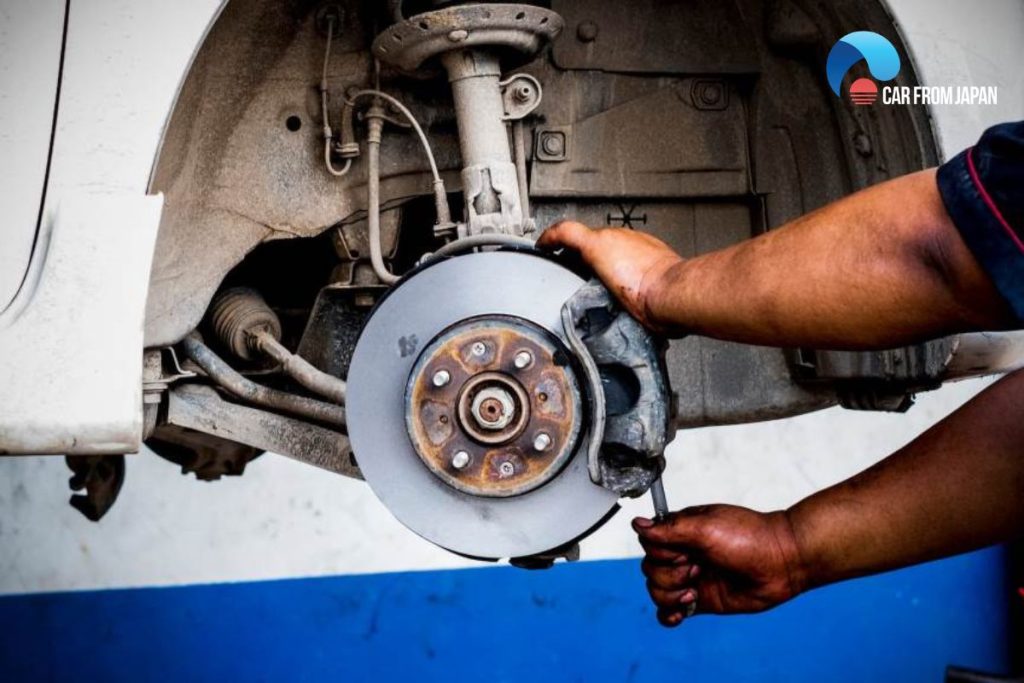
FAQs on Vibrating Brakes On Cars
Is it normal for cars to shake when braking at high speeds?
The fluid pressure in the calipers increases as you apply more force to the brakes, putting greater pressure on the brake pads and rotors.
When you apply the brakes, there may be brake pedal vibration if the caliper or caliper pistons are unable to adequately squeeze the brake pads against the rotors.
Do ABS brakes vibrate?
When braking, turning, or even just cruising, an unreliable ABS sensor may create vibrations.
Other signs to look out for include the traction control light, the ABS warning light, a spongy or harsh brake pedal, and instability when braking.
Can front shocks cause vibration when braking?
Usually not. However poor shocks can create wheel hop, which can lead to uneven tire wear that may be felt when braking.
However, warped brake rotors are the typical culprit for vibration, steering wheel trembling, and brake pedal pulsation when stopping.
Why does my brake pedal go to the floor?
If your brake pedal dips to the bottom, your brake system may be leaking or your brake pads are wearing down too quickly.
This can be more problematic because you need to replace your master cylinder.
Do not put off having your brakes inspected if your brake pedal hits the floor.
Final Words
Knowing these causes can now possibly make you understand the warning signs of an unsafe brake system and the circuit for brake pedal vibration. So, whenever you experience such signs, get your vehicle right away to the service station.
If the brake maintenance tips are followed then, these issues can also be kept at bay!

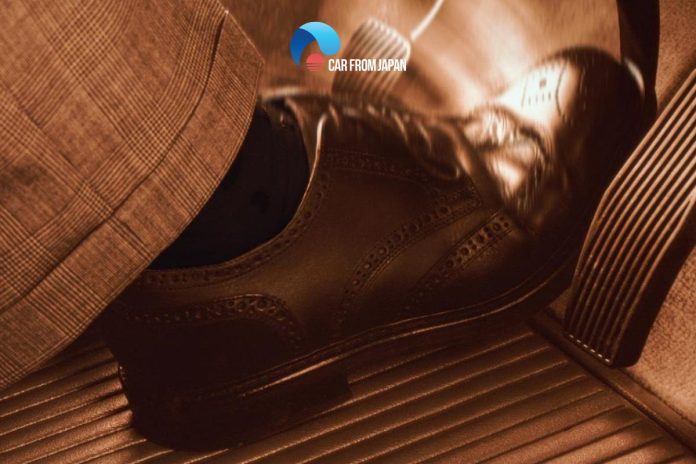


This is very important information given to us. Keep it up
Always share this info to my email below.Very helpful indeed
My toyota vitz 2005 model 2nd generation have a problem of brake failure.
When I pressed hard the brake padle it’s touch the floor and start vibration and noise and don’t apply brakes.and when soft apply the brake it’s work perfectly and doesn’t have any vibration nor sounds. I recently changed the pads.
I think this is happening with my toyota avensis after replacing brake pads, bu the garage can’t find the issue. Do you know what they found and changed to fix your issue?
2015 hunda elantra vibration in front end when applying brakes lightly going down hill,new pads and roters 3 times not the problem what could it be?pleas help